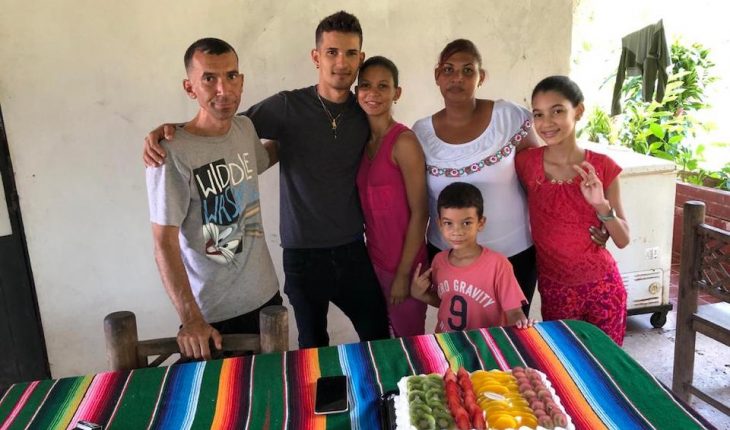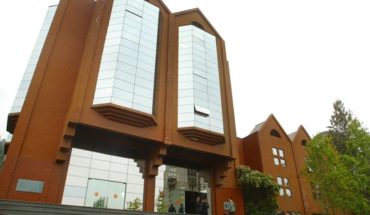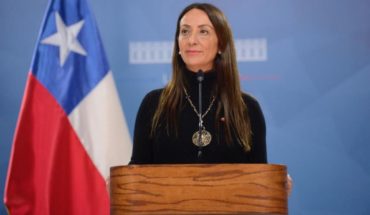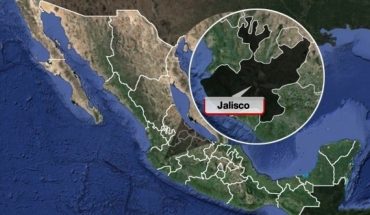Ramón Arboláez Abreu is 45 years old and has a tongue cancer that hardly lets him speak. He is Cuban, from the city of Marta Abreu, in the center of the island, and since January he enjoys the Complementary Protection granted by the Mexican Commission for Refugee Aid (Comar).
This is a status similar to that of refugees only without being able to appeal to family reunification. In theory, Mexico should ensure his care, that of his wife and that of his three daughters, with whom he left Cuba in 2016. However, he hasn’t had a doctor treat his tumor for months.
It is now located in Monterrey, Nuevo León, and the hospital to which it was assigned, the Metropolitan, has become an exclusive center for patients with COVID-19. So he can take up his pains with Diclofenate and wait for the pandemic to pass for a doctor to attend to him. “I just hope you get there on time,” he says, in Whatsapp message.
Going to a private consultation would be impossible. He doesn’t have any money. His wife and two children, aged 11 and six, sleep together in a single bed in the room that they rent with financial support from Unhcr. He can’t work and his partner has no documents, so he doesn’t have access to the job either.
Read more: We have to pay coyote to return to our country: Migrants stranded in Mexico by COVID
“He’s here without medical attention of any kind. He’s feeling bad every day. I don’t know what stay the disease is in, he hasn’t been tested. A doctor in Palenque sent him some tests, but we couldn’t afford them. Then they sent him to Monterrey to be taken care of but in the end it was closed,” says Yaidiel Prada, his wife. She answers questions over the phone. She says her husband can barely speak because of the disease.
The couple’s transit begins on November 18, 2016, a week before the death of Fidel Castro, who was president from the triumph of the revolution on January 1, 1959 to 2008. That day, Arboláez Abreu, Prada and their three sons marched to Trinidad and Tobago Says the man who was an anti-government activist. “I suffered threats, repressions and harassment from the police,” he says.
For three years he remained on the island, where he was recognized as a refugee. However, he was unhappy. He reports that the authorities withdrew his passport, that he was never returned to him. From that time there is evidence of an arrest when, along with eight other Cubans, they obstructed the passage to the UN office demanding their relocation as refugees to the United States.
In 2019 they left the island illegally and crossed through the middle of Latin America to reach Mexico. In their transit they had to cross the Darien jungle, a dangerous enclave located between Colombia and Panama in which dozens of migrants and asylum seekers lose their lives every year.
Find out: ‘I gave up on my American dream and COVID gave me the opportunity to help migrants like me’
On August 28 last year they arrived in Chiapas through Frontera Corozal, in Chiapas. Agents of the National Migration Institute (INM) arrested them and spent 15 days in the migration station until they were released. They stayed in Palenque until comar resolved his asylum claim.
That’s where a doctor detected Arboláez Abreu’s cancer.
“My husband was aggravated by the disease. He had no medical assistance, the general hospital had no resources and we couldn’t travel anywhere because we weren’t allowed out of the state,” his wife explains.
Finally, they received the status of Complementary Protection. This figure applies in cases where the Mexican authorities consider that the applicant does not apply to refugee status but considers that he cannot return him to his place of origin because he believes that his human rights could be violated. With the papers in order they were transferred to Villahermosa, Tabasco. There, a Cuban doctor told them that his tongue and nodes should be removed. He also asked for several studies. But, according to Yaidiel Prada, the medical center was unable to perform them and they suggested that they go to a private clinic. Its cost was 17 thousand pesos. I wasn’t within reach of the family.
“Due to the contingency of the virus we were transferred to Monterrey for medical assistance,” she explains. Upon arriving in Nuevo León, Arboláez Abreu was sent to the metropolitan hospital. He was given an appointment for May 25. The date is here and the hospital was still closed. They only care for patients with COVID-19.
“The alternative they gave us was to go ordering drugs from a private office. With what money? My husband can’t work and I don’t have papals,” Prada complains.
Since then, marriage and the two young children, aged eleven and six, livedin a small room they rent with The support of Unhcr. “15 days ago we got a bag of food, but it’s not enough,” she laments.
“Every day my husband is deteriorating. He has no medical assistance and gives him a headache. The little he sleeps is because he takes some sedatives,” he explains. Without a date for a medical appointment, the family is desperate.
You may be interested: Migrants from another world: crossing from Asia and Africa to reach North America
Animal Político consulted with Unhcr on the family situation. Sources of the international body explained that they have a policy of not commenting on particular cases.
As a general rule, however, they offer financial assistance of up to three months, with an amount that depends on the vulnerability analysis being performed. Depending on the need, exceptional supports may even occur.
The COVID-19 pandemic led to an extension of these criteria, these sources explained. For example, with financial aid to people who were already in the process of integration and had a job but lost it because of the health crisis. In total, more than 5,000 people have received this help.
The other institution that supports refugees in Mexico is comar. Agenci sources assured Animal Politician that they will follow up on the case.
Without work or expectations, Arboláez Abreu has changed its priorities. Before his dream was to get to America. Now he just wants someone to help him with the cancer. He called for support from U.S. congressmen, but his efforts have been unsuccessful. He still needed someone to take care of his medical expenses. That’s why he asks for help and trusts that “I’m not too late.”
What we do in Animal Político requires professional journalists, teamwork, dialogue with readers and something very important: independence. You can help us keep going. Be part of the team.
Subscribe to Animal Politics, receive benefits and support free journalism #YoSoyAnimal.
translated from Spanish: A Cuban with state protection has been untreated for cancer for months
June 21, 2020 |





